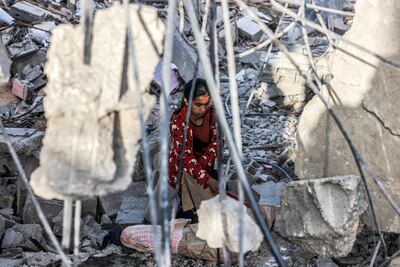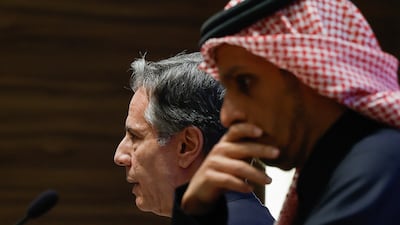Live updates: Follow the latest on Israel-Gaza
Qatar faced mounting US pressure to push Hamas into accepting ceasefire proposals drawn up with support from American and Egyptian mediators, sources said on Wednesday.
The two sources told The National that Qatari mediators, led by Prime Minister Sheikh Mohammed bin Abdulrahman, had made thinly veiled warnings to the Hamas leaders based in Doha that they would be asked to leave if they did not show flexibility during Gaza truce negotiations.
On other occasions, Qatari mediators had hinted at freezing what the sources said were multimillion-dollar Hamas investments in the region in the hopes that it would persuade the group to abandon or soften its conditions to secure a ceasefire.
Revenues from such investments are partially used to help families of Hamas fighters killed or seriously wounded in battle as well as Palestinians held in Israeli jails, according to the sources.
Qatar had also warned that it would withdraw from pledges to generously help fund Gaza's postwar reconstruction, which is initially estimated to run into billions of dollars, said the sources.
“Hamas, just as the case with Israel, is partly to blame for the current suspension of the negotiations through their insistence on their demands," said one of the sources.

A Qatari source told The National the mediation was "credible and neutral, and does not use pressure on any party in the process".
The accusations came one day after Doha said that there was no reason for Hamas to move its headquarters outside the country, where it has been based since 2012.
“As long as their presence here in Doha, as we have always said, is useful and positive in this mediation effort, they will remain here,” Foreign Ministry spokesman Dr Majed Al Ansari said.
The Qatari source added: "The Hamas office in Doha was established in co-ordination with the United States and played important roles in bringing peace and reducing escalation in Palestine.
"It is still playing the same role in the negotiation process during this war in order to stop the war and [bring about the] return of hostages."
The Gaza war, now in its seventh month, was triggered by an attack by Hamas in southern Israel that killed about 1,200. About 250 were taken hostage. Israel’s response was a devastating bombing campaign and incursion that has killed more than 34,200 Palestinians.
During a week-long ceasefire in late November, about 100 Hamas-held hostages were returned in exchange for the release of about 300 Palestinians in Israeli jails.
More than four months of on-and-off negotiations have since failed to produce a ceasefire with both sides remaining steadfast over their demands.
Hamas has said it will not accept anything other than a complete Israeli withdrawal from Gaza, a permanent ceasefire, unconditional return of displaced Palestinians to their homes in northern Gaza and the sufficient flow of aid to the territory.
Israel has branded the demands of Hamas as delusional and has repeatedly vowed to dismantle the group’s military and governing capacities as well as the release of the remaining hostages.
The sources said Hamas leaders based in Qatar, led by Ismail Haniyeh and Khaled Mashal, were considering alternatives if they were ever forced to leave, with Turkey at the top of the list of alternative bases.
On Tuesday, Qatar expressed concern over comments by Israeli ministers that questioned Doha’s mediation to end the Gaza war.
“Qatar is undergoing reassessment in its role as mediator. This has to do with a lot of factors, including various comments from Israeli officials,” Mr Al Ansari said.
“They all know the nature of the Qatari mediation, they are telling lies about the role of Qatar just to keep their positions. This cannot be justified,” he said.
“We need serious commitment from all sides … attacking mediators is a sign of lack of seriousness,” he said. Mediation, he said, was the “only way” to end the war in Gaza, which entered its 200th day on Tuesday.
His comments echoed remarks made the previous day by Prime Minister Sheikh Mohammed bin Abdulrahman, who said Doha was hopeful despite the stalled negotiations.
Israeli Prime Minister Benjamin Netanyahu and several members of his cabinet have criticised Doha over its support of Hamas.
Nir Barkat, Israeli Minister of Economy and Industry, described Qatar as a “wolf in sheep's clothing” in an interview with Bloomberg.
Speaking to US Jewish leaders in February, Mr Netanyahu said Qatar “can press Hamas as no one else can”, prompting Doha to condemn his “empty” claims.


